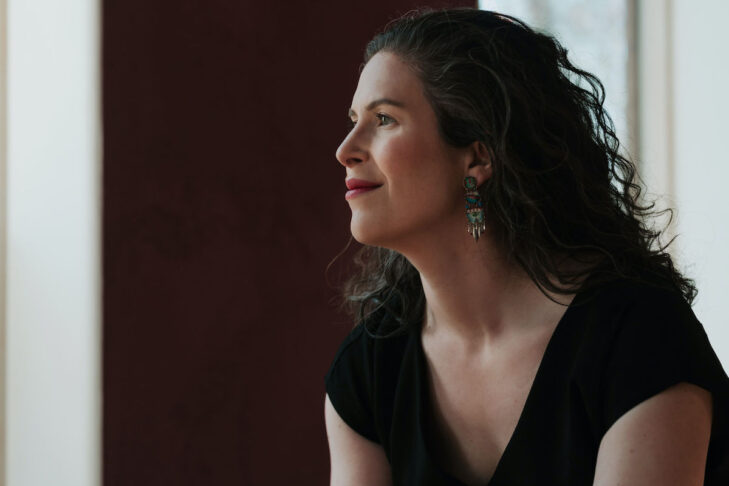While I was wondering how to occupy my kids in quarantine, Natick mom Bev Klau was creating her very own app: Verbina is a digital storytelling app where users can connect with friends and family to swap video stories with a chosen circle. (Check out the explainer here!) If you’ve got a dad who loves sending three-minute video texts, this app just might be for you.
How’d you get this idea?
I spent my entire adult life as an educator, and I spent a lot of time in Jewish education and facilitation and community-building. I’ve worked at Jewish day schools, been a principal at religious school and worked at Jewish overnight camp. I’ve spent a lot of time in Jewish life and in Jewish spaces, and really the common thread in all of the work has been about creating spaces where people can share meaningfully and connect with each other. My greatest passion has always been community-building, whether that was in the classroom or temple, and now trying to bring it to scale with this app.
What does the app do? What’s the hope and the goal?
Verbina is designed to deepen connection and build community, and the idea is that we’re gathering stories that give our lives purpose, meaning and wholeness. That’s the intention behind it. In this day and age, I think we’re sometimes inundated to the point of distraction with apps, and they’re not all good-quality.
So, what’s the gap that you hope to fill, and why is it different?
I think we’ve all seen the pitfalls of social media lately, and this is really a different kind of platform—because it’s not about amassing likes or followers or self-promotion. Really, the goal is inviting people into conversation and building community. And all the information is private. I don’t know if you’re familiar with “The Social Dilemma,” which I think put it really well. If you’re not paying for the product, you are the product. When we’re spending time on other platforms, they’re really gathering all this information about us, and that’s not what’s happening on Verbina. So it’s unique in that way. Our goal really is to reweave the fabric of our communities, one conversation at a time.
After spending so much time in Jewish life and Jewish education and in temples, I really see that it could fill a real need for Jewish communities. It’s not limited to that. It’s really about community, whether your community is your family or your book club.
What do you think is missing in terms of our communication these days, especially during the pandemic?
People are in some ways really over-Zoomed, or they’re trying to find other ways to connect. What Verbina allows you to do is connect asynchronously, which is not the case with Zoom. Each conversation has a real intention behind it; everything has a real focus. And I think our lives are so fractured and harried and stressed right now; I think to have a real, focused conversation would be really helpful.
I’m really hoping this can be a way that really connects people and makes people feel good. So much research has been done that people spend time on social media and it makes them feel badly. We know that it really devolves into such negative ways and really breaks us apart. Whereas this is different. It’s video-based, so when you post a story, your face is attached to it. And so it takes more effort than just sitting there and just writing off the first thing you think of. You have to pause and actually think. And you only have 90 seconds, so you have a finite amount of time to contribute your story. Because your video is there, I think that it asks more of people—but I think the outcome is a better, more thoughtful contribution.
What’s the Jewish connection?
The “bina” in “Verbina” refers to “binah,” like Jewish wisdom. It’s really at the core of everything I do, in terms of why community is so important to me. It’s very hard for me to tease out where I end or Judaism begins. I think also this idea of lashon hara, of not having negative speech, refers to the way this is also set up. There’s a curator for the conversation. If there is a contribution that shouldn’t be there, whether it’s inappropriate for whatever reason, the curator can delete it. I think that from facilitating in so many Jewish contexts, this was at the heart of what I knew this app needed—a filter and a way to make sure this was a strong way to have deeper conversation.
Give us a plug: How do we use it?
It’s available to download for free on the Apple App Store and Google Play. A curator creates the invitation, and the invitation is really at the heart of the app. That’s where the intention behind every conversation is, and they really set the tone. The curator then shares this invitation with others, either through email or text, or even through other social media channels, and they invite people in. Once you’ve created one free conversation—we call them “galleries”—then you can subscribe at different levels.
How do you hope people feel when using Verbina?
I just really hope it gives people connection to not only the communities they’re connecting with through the app but also to themselves. I think any time you are involved with something beyond yourself, you connect to a greater purpose. I’m hoping it gives people greater connection and purpose in their lives. I don’t know when I’m going to be getting on an airplane and seeing my brother in California, so this is a way for us to share family stories, to stay connected. And I’m hoping it’s also a way for institutions to connect to their communities as well.



